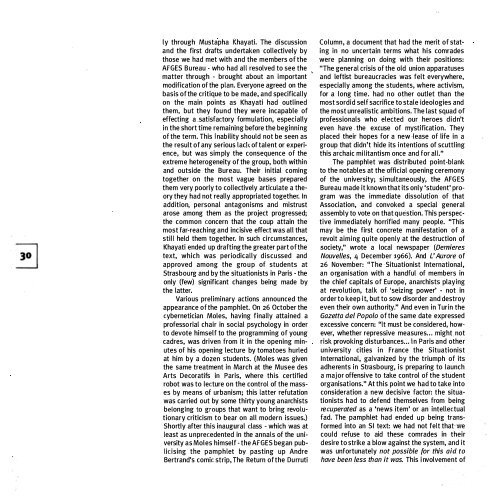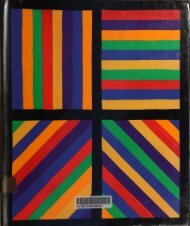SITUATIONISTS AND THE 1£CH MAY 1968
umMYFs
umMYFs
Create successful ePaper yourself
Turn your PDF publications into a flip-book with our unique Google optimized e-Paper software.
ly through Mustapha Khayati. The discussion<br />
and the first drafts undertaken collectively by<br />
those we had met with and the members of the<br />
ArGES Bureau - who had all resolved to see the<br />
matter through - brought about an important '<br />
modification of the plan. Everyone agreed on the<br />
basis of the critique to be made, and specifically<br />
on the main points as Khayati had outlined<br />
them, but they found they were incapable of<br />
effecting a satisfactory formulation, especially<br />
in the short time remaining before the beginning<br />
of the term. This inability should not be seen as<br />
the result of any serious lad< of talent or experi·<br />
ence, but was simply the consequence of the<br />
extreme heterogeneity of the group, both within<br />
and outside the Bureau. Their initial coming<br />
together on the most vague bases prepared<br />
them very poorly to collectively articulate a the·<br />
ory they had not really appropriated together. In<br />
addition, personal antagonisms and mistrust<br />
arose among them as the project progressed;<br />
the common concern that the coup attain the<br />
most far-reaching and incisive effect was all that<br />
still held them together. In such circumstances,<br />
Khayati ended up drafting the greater part of the<br />
text, which was periodically discussed and<br />
approved among the group of students at<br />
Strasbourg and by the situationists in Paris · the<br />
only (few) significant changes being made by<br />
the latter.<br />
Various preliminary actions announced the<br />
appearance of the pamphlet. On 26 October the<br />
cybernetician Moles, having finally attained a<br />
professorial chair in social psychology in order<br />
to devote himself to the programming of young<br />
cadres, was driven from it in the opening min·<br />
utes of his opening lecture by tomatoes hurled<br />
at him by a dozen students. (Moles was given<br />
the same treatment in March at the Musee des<br />
Arts Decoratifs in Paris, where this certified<br />
robot was to lecture on the control of the masses<br />
by means of urbanism; this latter refutation<br />
was carried out by some thirty young anarchists<br />
belonging to groups that want to bring revolu·<br />
tionary criticism to bear on all modern issues.)<br />
Shortly after this inaugural class • which was at<br />
least as unprecedented in the annals of the university<br />
as Moles himself - the ArGES began publicising<br />
the pamphlet by pasting up Andre<br />
Bertrand's comic strip, The Return of the Durruti<br />
Column, a document that had the merit of stat·<br />
ing in no uncertain terms what his comrades<br />
were planning on doing with their positions:<br />
"The general crisis of the old union apparatuses<br />
and leftist bureaucracies was felt everywhere,<br />
especially among the students, where activism,<br />
for a long time. had no other outlet than the<br />
most sordid self sacrifice to stale ideologies and<br />
the most unrealistic ambitions. The last squad of<br />
professionals who elected our heroes didn't<br />
even have the excuse of mystification. They<br />
placed their hopes for a new lease of life in a<br />
group that didn't hide its intentions of scuttling<br />
this archaic militantism once and for all."<br />
The pamphlet was distributed point-blank<br />
to the notables at the official opening ceremony<br />
of the university; simultaneously, the AFG ES<br />
Bureau made it known that its only 'student' program<br />
was the immediate dissolution of that<br />
Association, and convoked a special general<br />
assembly to vote on that question. This perspective<br />
immediately horrified many people. "This<br />
may be the first concrete manifestation of a<br />
revolt aiming quite openly at the destruction of<br />
society," wrote a local newspaper (Dernieres<br />
Nouvelles, 4 December 1966). And L' Aurore of<br />
26 November: "The Situationist International,<br />
an organisation with a handful of members in<br />
the chief capitals of Europe, anarchists playing<br />
at revolution, talk of. 'seizing power' • not in<br />
order to keep it, but to sow disorder and destroy<br />
even their own authority." And even in Turin the<br />
Gazetta del Popolo of the same date expressed<br />
excessive concern: "lt must be considered, however,<br />
whether repressive measures ... might not<br />
risk provoking disturbances .•• ln Paris and other<br />
university cities in France the Situationist<br />
International, galvanized by the triumph of its<br />
adherents in Strasbourg, is preparing to launch<br />
a major offensive to take control of the student<br />
organisations." At this point we had to take into<br />
consideration a new decisive factor: the situa·<br />
tionists had to defend themselves from being<br />
recuperated as a 'news item' or an intellectual<br />
fad. The pamphlet had ended up being trans·<br />
formed into an SI text: we had not felt that" We<br />
could refuse to aid these comrades in their<br />
desire to strike a blow against the system, and it<br />
was unfortunately not possible for this aid to<br />
have been less than it was. This involvement of










